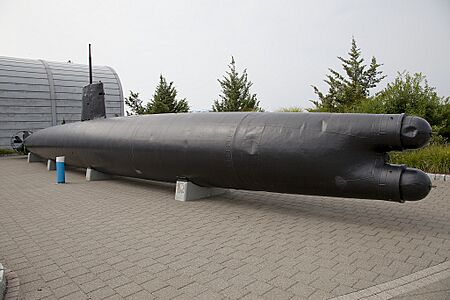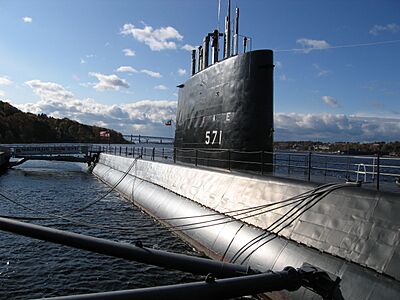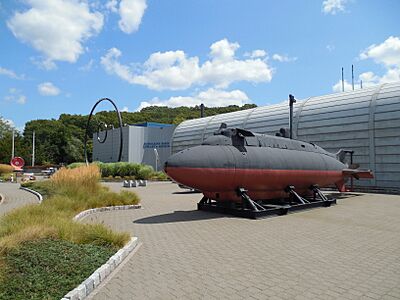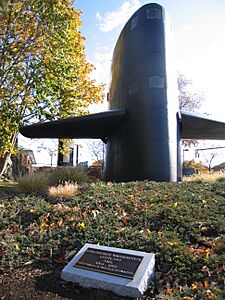Submarine Force Library and Museum facts for kids
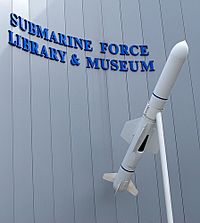
A UGM-84 missile outside the entrance
|
|
| Established | 1955 |
|---|---|
| Location | Groton, Connecticut |
| Type | Military museum |
| Collection size | 33,000 artifacts 20,000 significant documents 30,000 photographs |
| Visitors | 150,000/year |
The Submarine Force Library and Museum is a cool place to visit in Groton, Connecticut. It sits right by the Thames River. This museum is super special because it's the only submarine museum run entirely by the U.S. Navy. It holds many important submarine items, including the famous USS Nautilus (SSN-571). You can even take a 30-minute audio tour inside the Nautilus itself!
Contents
Museum History
How the Museum Started
The museum began in 1955. It was first called the Submarine Library. The Electric Boat Company (EB) created it. EB is a company that builds submarines.
In 1964, EB gave the library to the U.S. Navy. The Navy then moved it to its current spot. This new home was right next to the Naval Submarine Base New London. The museum got its official name in 1969.
Growing Bigger
In 1984, a group called the "Connecticut Nautilus Committee" formed. They wanted to make the museum better. They also hoped the Navy would give them the Nautilus submarine.
Money for a new building came from the state, people, and businesses. A new, larger building opened in 1986. It was about 14,000-square-foot (1,300 m2) big.
Later, in 1997, the Committee planned an even bigger addition. This new part would be about 13,465-square-foot (1,250.9 m2). They started raising money in 1998. Construction finished in early 2000. The new addition opened on April 28, 2000. This was part of a big celebration. It marked 100 years of the United States Submarine Force.
Amazing Collections and Exhibits
Submarines and Artifacts
The museum has about 33,000 cool items. One of the most famous is the USS Nautilus. This was the very first nuclear-powered submarine in the world! The Nautilus was launched in 1954. It stopped being used by the Navy in 1980. During the Cold War, it even traveled under the polar ice cap. It was the first submarine to reach the North Pole.
You can also see a copy of David Bushnell's Turtle. This was built in 1775. It was the first submarine ever used in a battle!
Other exhibits include:
- Small submarines from World War II.
- Real working periscopes.
- Parts saved from the nuclear Submarine NR-1.
- A submarine control room you can explore.
- Many models of different submarines.
- The Submarine X-1, which was an experimental military submarine.
Outside the museum, near the entrance, you can see a large part of the USS George Washington. This was the first nuclear-powered submarine that could launch missiles.
The Library and Documents
The museum also has a library. It holds about 20,000 documents. There are also 30,000 photos. All of these are about the history of submarines.
The library has 6,000 books. These books are also about submarine history. One book is from 1551. It talks about how to find and bring up submarines from the water. There's also an 1870 copy of Jules Verne's famous book, Twenty Thousand Leagues Under the Seas. With it, you can see a model of the fictional Nautilus from the book.
Important documents in the collection include notes from John Philip Holland. He designed the Navy's first official submarine. There are also unique items from World War I and World War II. The library also has collections from the Electric Boat Corporation and the Navy.
Images for kids
-
The SS X-1 Midget Submarine outside the museum
See also
 | Emma Amos |
 | Edward Mitchell Bannister |
 | Larry D. Alexander |
 | Ernie Barnes |



